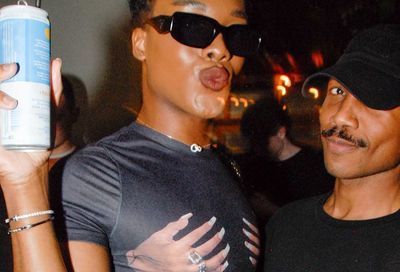Imitation of Life
From broad and bracing fables to American suburbia, two plays delve into the human condition
You may have heard by now that it’s a play about many things. It’s a play about Christians depicting the enduring passion play and the suffering of Christ during three very delicate and deliberate points in history. It’s a politically-loaded, elongated series of meandering scenes that stretch beyond three hours. It’s a theologically-charged story rendered indescribable by way of comedy or drama, fact or fiction. And it’s a theatrical event receiving its world premiere in the heart of the capital of the free world.
While all of the above notions are inarguably true, Sarah Ruhl’s Passion Play, a cycle is more than a glistening beehive of controversial art and rhetoric. It’s more than a mere examination of religious hypocrisy and ethical obligations, more than a study in humanity or some fanciful theory on how lessons are extracted from the memory of souls. Ruhl’s Passion Play is both epic and endemic, efficient and elaborate, evasive and exacting.
In short, it is one extraordinary work of theater.
Over the course of three whimsical, bracing acts, Ruhl explores the lives of the players reenacting the final days of Jesus of Nazareth. The first act is set in Northern England during the reign of Queen Elizabeth I, who sought to forbid religious productions on stage in 1575. The second act swings forward to 1934 Oberammergau, a small Bavarian town where its reverent cast splinters under the influence of the Nazi regime. For the final act, Ruhl imagines the impact of the Vietnam War and campaigning presidents among the makeshift stages and highway toll booths of Spearfish, South Dakota in the 1970s, ’80s, and up to the present. Her feat is one of remarkable ambition, and the result is a riveting and intelligent fable that burns with real drama and astonishing imagery, falling just short of a modern-day fairy tale.
After commissioning Ruhl to compose the last act for Arena Stage, Molly Smith convinced the much-lauded Pulitzer Prize finalist (for The Clean House) to combine her fascinating three acts together in one enterprising venture. The lyrical quality of her dialogue and the lush, romantic language that has developed into Ruhl’s signature is still evident in her narrative, where she marries the mundane with the immortal and the magnanimous with the miniscule. The wonder of Ruhl’s conceit is how adeptly her Passion Play knocks the most complex concepts — religious dogma, personal faith, the politics of art and artistic license — up against simple, familiar ideals of truth, love and beauty. It’s one of the most incredible stories ever fashioned for the theater, yet it never strays into territory that proves too nebulous or esoteric in scope.
There are pockets of poetry and fantastic realism tucked inside Ruhl’s script, and Smith seizes every opportunity to stage her enchanting symbolism with breathtaking precision. From tall, dancing fish to lighthearted scenes reminiscent of a more sophisticated Waiting for Guffman, Smith’s clean direction steers her 12-member ensemble with clarity and perspective.
Of course there aren’t many plays where an actor playing an actor playing Jesus enlists in the Nazi regime to persecute the Jews he grew up with in his hometown, or where the village idiot makes the sky turn red, or where a soldier who usually portrays Pontius Pilate in his hometown play comes back from war forever haunted by the ghosts of his past. Howard Overshown, Polly Noonan, and Felix Solis all turn in exceptionally strong performances, with Solis leading the pack in three distinct roles that culminate into one karmic spirit for the finale.
And of course not many actors find an opportunity to portray Queen Elizabeth I, Adolf Hitler, Ronald Reagan, and Richard Nixon all in one production, much less carry out such demanding historical icons with conviction. Yet Robert Dorfman is the highlight of the evening, managing quite a workout between his stern queen, amiable Reagan, and a spine-tingling, chilly rendition of Hitler, who interrupts the proceedings on more than one occasion to spew forth his vicious propaganda.
Dorfman dons striking costumes from Linda Cho, and the company takes their cues from original music interludes and sound designed by André Pluess. Scott Bradley’s versatile set creates a shifting simulacrum of a church or temple, with large wooden pieces that spring up from the floorboards or hover over the stage.
|
An extraordinary play of beauty and vision, Passion Play, a cycle is a glorious undertaking that does not apologize for its lithe trek into terrain that leaves its audience questioning all sorts of ideas on the timeliness of lessons learned and forgotten. Yes, Ruhl has crafted a play that is about many things and is many things. It is a piece of art that is passionately political, philosophical, fanatical, and — above all else — phenomenal.
If there’s a hot-button topic begging to be addressed, you can rest assured that the savvy snouts at Woolly Mammoth will sniff it out. With one finger poised at the ready, they found in Gina Gionfriddo’s After Ashley a devastating exposé on how mindlessly our country has become conditioned to cope with grief and tragedy. A searing indictment on our insensitive and exploitive media culture, Gionfriddo uses a typical (read: dysfunctional) American family to demonstrate our obsession with victims of crime.
Apparently life in the suburbs of Bethesda isn’t all it’s cracked up to be. From outside their white picket fence, the Hammonds appear all-American, all the time. Dad covers education for a major national newspaper and Mom teaches art to school kids. Fourteen year-old Justin is as smart as a whip. But like any true American family, that glossy veneer can quickly crack and crumble, revealing deeper, darker wounds. When Mom Ashley is murdered in her own basement by the schizophrenic lawn man, Dad writes a bestseller and lands his own ”I Lost Someone Too” television crime show. All of this overexposure and sudden fame is too much for Justin — now recognized as the ”9-1-1 Kid” — who just wants to mourn in peace.
It could be called The Great American Grieving Play, but After Ashley is too intelligent to stay mired in sad, tragic tears. Under the pitch-perfect direction of Lee Mikeska Gardner, Gionfriddo’s shadowy world of parasitical pragmatics and pensive loners becomes instantly distinguishable as our own mad universe of television personalities and perverse attitudes toward celebrity.
|
With truth so uncomfortable it will have you shifting in your seat, Gardner’s cast delivers Gionfriddo’s wry humor and deadpan wit with no simple panache. There are spectacular, understated performances from both Mark Sullivan and Deanna McGovern, and Marni Penning is the manic mother and art teacher who doesn’t like art — or children. Bruce Nelson crafts an acute, finely-tuned Alden Hammond, while Paul Morella is appropriately slimy as the host of ”Profiles in Justice.” But it is Michael Willis’ super-creepy Roderick Lord, a ”guide in erotic exploration,” that will leave you questioning all that is right and holy in the world.
A reminder of how Americans should honor victims and families of public tragedy, After Ashley features spirited, moody lighting by Lisa L. Ogonowski, and Michael Kraskin is credited with composing the perfectly awful ”9-1-1 Kid Remix.” Not always heavy and not always light, Gionfriddo has added to our national repertoire a domestic bad dream that ends in marvelous, provocative theater.
Support Metro Weekly’s Journalism
These are challenging times for news organizations. And yet it’s crucial we stay active and provide vital resources and information to both our local readers and the world. So won’t you please take a moment and consider supporting Metro Weekly with a membership? For as little as $5 a month, you can help ensure Metro Weekly magazine and MetroWeekly.com remain free, viable resources as we provide the best, most diverse, culturally-resonant LGBTQ coverage in both the D.C. region and around the world. Memberships come with exclusive perks and discounts, your own personal digital delivery of each week’s magazine (and an archive), access to our Member's Lounge when it launches this fall, and exclusive members-only items like Metro Weekly Membership Mugs and Tote Bags! Check out all our membership levels here and please join us today!




















